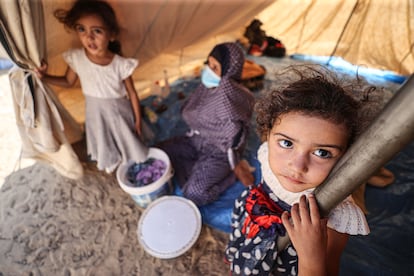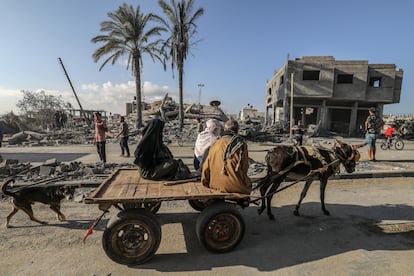Trapped in southern Gaza: ‘Life here is counted in hours, not days. There is no respite’
The humanitarian crisis is deepening in the south of the Strip, where people fled after Israel’s ultimatum. But many are finding that they are not safe there either

“Death is everywhere in Gaza. You live in the north, you survive the bombings and you go south, obeying Israeli orders and thinking that you will be safer, but they kill you anyway. That is what is happening, and it is called genocide.” Samir Zaqut, deputy director of the Gazan humanitarian organization Al Mezan, speaks hurriedly from the house of a relative in the Rafah region — near the border crossing that is scheduled to open this Friday to let humanitarian aid through from Egypt — where he is living in crowded conditions together with 25 other people. Minutes before receiving the call from this newspaper, he learned that at least six civilians had died in the attack on a United Nations school inside the Al Maghazi refugee camp, in the center of the Gaza strip, where displaced people from the north had taken refuge. He could not contain his rage. “They came here to avoid getting killed and look. No one is spared.”
According to the UN, one million people, that is to say nearly half the population of Gaza, have been displaced since October 7, and 400,000 of them have sought shelter in buildings managed by the UN Agency for Palestinian Refugees (UNRWA). In the Rafah region, at the southern end of the Strip, bordering Egypt, where some 260,000 people lived before this new offensive against Gaza, according to official Palestinian figures, family homes and schools have become too small for so many people.
“I don’t even know when I got here. I think it was three days ago. Since we don’t leave the house, we don’t have electricity and our lives are spent counting the bombs, we have even lost track of time,” says Zaqut. Fear, lack of sleep and food, and the scenes of death and destruction all around them are beginning to take their toll on part of the population.
There are people who decided to take refuge in the south a few days ago, who have returned to their homes in the north or are considering doing so because they see that there is no safe place in the entire StripSamir Zaqut, deputy director of Al Mezan
The testimonies from Rafah collected by this newspaper describe very harsh living conditions, which will only get worse if the humanitarian aid stuck on the other side of the border is not allowed to enter. On a visit to Israel on Wednesday, U.S. President Joe Biden announced an agreement to allow food and medicine into Gaza from Egypt through the Rafah border. Around 20 trucks are expected to be able to cross this Friday, when the damage from Israeli airstrikes on the access road is repaired.

Many people left their homes in northern Gaza with barely any possessions, and are sleeping on the floors and stairs of UN schools, or anywhere they can find. They have almost no water, food has been rationed with priority given to children, there is no electricity or gas for cooking, and people are increasingly isolated due to very poor internet connections.
“Hospitals cannot continue working either, because there is no fuel, electricity or water. Still, they are overcrowded and the doctors have not rested for a week. A significant number of doctors have also died in the bombings. This is horrible. Life here is counted in hours, not days. And we don’t have a minute of respite,” says Zaqut.
An “aggression by the international community”
The news of the bombing of the al-Alhi al Arabi hospital on Tuesday in Gaza City, where there were 471 deaths, according to calculations by the Palestinian authorities, has multiplied fear, helplessness and feelings of anger in the Rafah area.
For Zaqut, “it is very clear that the international community is now part of this aggression. It’s not just Israel anymore, it’s the United States, the United Kingdom, France, Germany... They are all part of this too. They are destroying international humanitarian law. I cannot understand how a free person, who sees what is happening, does nothing about the extermination that is taking place in Gaza.” He also maintains that there are countries that are trying to criminalize “those who defend the Palestinians.”
Gazans have also gathered around the Rafah border crossing, waiting for it to open so they can be evacuated to Egypt thanks to their foreign passport. In the Strip, where 20 or 25 years ago people had greater freedom to come and go, there were people who studied and worked abroad for long periods, formed a family and acquired the nationality of those countries. But, for now, the Rafah crossing, which has been partially bombed these days by Israel, has been closed on the Egyptian side and no one can enter or leave.
“When they open it, it will be so that foreigners can leave, first the Americans. But our lives don’t matter to anyone,” says a member of the Harb family, who prefers not to give his name. There are more than 30 of them living in a small apartment in Rafah, where a relative welcomed them in. They eat once a day and drink the bare minimum. “We don’t know how long this is going to last, so we are rationing the supplies. But the worst thing is that we can’t recharge the phones because we don’t have a working generator and we don’t have any batteries left. So we go out to the street to charge our cell phone in the battery of a car that we have parked downstairs. We cannot remain incommunicated,” they explain.
We are running out of everything: food and water, but also patienceSalah Awad El Sousi, a resident of Gaza with a Spanish passport
Among the people who want to leave Gaza there are also around 100 Palestinians with Spanish passports who went to the border crossing last Saturday in the hopes of being evacuated. After waiting six hours outdoors, they had to turn back because the exit door never opened. “South or north… there is no difference. The Israeli bombings have the same intensity. We are running out of everything: food and water, but also patience,” says Salah Awad El Sousi, spokesperson for this group of Gazans with Spanish citizenship.
Others, like Zaqut or the Harb family, are not even considering leaving Gaza. They believe that leaving the Strip could mean never being able to return, as happened to their grandparents, who arrived in the enclave in 1948 after forcibly leaving their homes in other areas after the creation of the State of Israel.

“People don’t want to leave. What’s more, there are people on the other side of the border, in Egypt, who were caught outside Gaza for family or health reasons and who want to be reunited with their families. And, furthermore, there are people who decided to take refuge in the south, but have returned to their homes in the north or are considering doing so because they see that there is no safe place in the entire Strip,” says Zaqut.
The Al Mezan human rights center, of which Zaqut is deputy director, provides legal assistance and information on the consequences of the Israeli blockade on Gaza. It continues to feed its social media and its website thanks to collaborators who are outside the Palestinian territories. “Our workers in Gaza do not even have the possibility to charge their mobile phones. That is why we have colleagues outside, some of them in Europe, who keep the Al Mezan flame alive and the contact with other international organizations with which we work,” he explains. “Meanwhile, we are fighting every day for the most basic thing: survival. For this we need fuel and medicine because if not, this is going to be a disaster,” he insists.
Zaqut fears that there are still “hundreds of people under the rubble throughout Gaza” and believes that the death tolls provided by the Ministry of Health, which places the figure at over 3,000, “are much lower than the real situation.” “But we do not have the capacity at this moment to rescue these people, alive or dead, and include them in our statistics,” he insists. “Israel presents us as animals, as savages who kill children, who use them as human shields, who cut off their heads... And who cares about killing animals, right?”
Sign up for our weekly newsletter to get more English-language news coverage from EL PAÍS USA Edition
Tu suscripción se está usando en otro dispositivo
¿Quieres añadir otro usuario a tu suscripción?
Si continúas leyendo en este dispositivo, no se podrá leer en el otro.
FlechaTu suscripción se está usando en otro dispositivo y solo puedes acceder a EL PAÍS desde un dispositivo a la vez.
Si quieres compartir tu cuenta, cambia tu suscripción a la modalidad Premium, así podrás añadir otro usuario. Cada uno accederá con su propia cuenta de email, lo que os permitirá personalizar vuestra experiencia en EL PAÍS.
¿Tienes una suscripción de empresa? Accede aquí para contratar más cuentas.
En el caso de no saber quién está usando tu cuenta, te recomendamos cambiar tu contraseña aquí.
Si decides continuar compartiendo tu cuenta, este mensaje se mostrará en tu dispositivo y en el de la otra persona que está usando tu cuenta de forma indefinida, afectando a tu experiencia de lectura. Puedes consultar aquí los términos y condiciones de la suscripción digital.








































